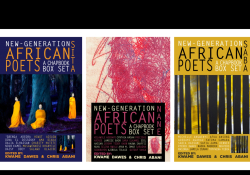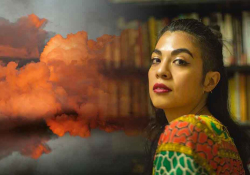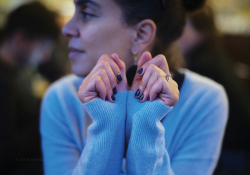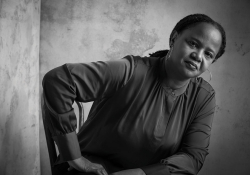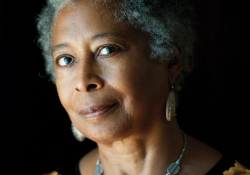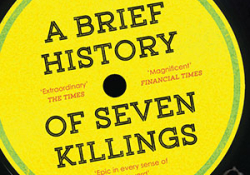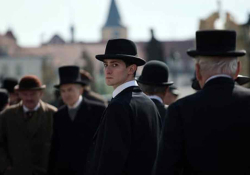Nigerian Fiction Reenvisions the Masculine
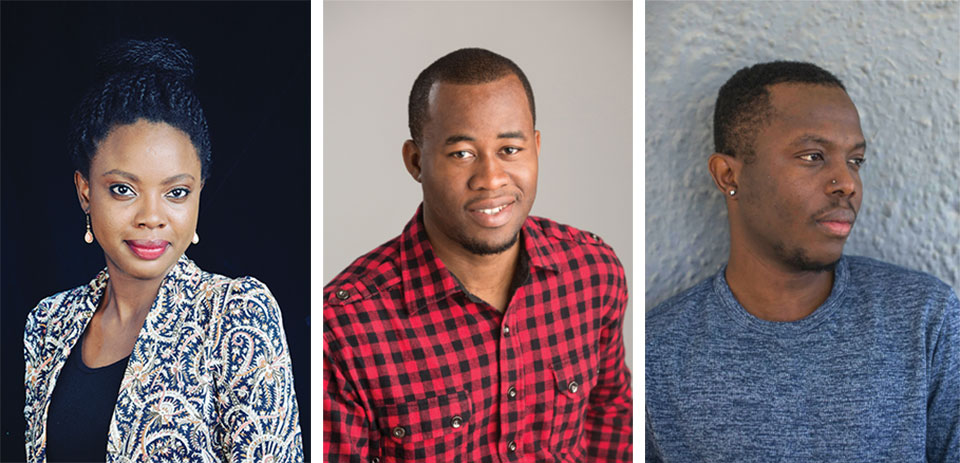
Three millennial writers probe inner male conflict while the patriarch Achebe looks on.
A man lays his head on his wife’s belly to comfort her when she blames herself for their childless plight. But when he blames himself, he falls prey to violence. Another man saves a woman from suicide and soon falls in love with her. But he can’t save her from his violent hand. Two other men lie swaddled together in cotton like babies. But one wields a gun.
The Nigerian millennial writers Ayobami Adebayo, Chigozie Obioma, and Romeo Oriogun have created male characters who inhabit vastly different fictional worlds, but these characters share a similar torment. While they can be deeply sensitive and tender, when inner sensitivity and external threat render them vulnerable, they become prone to inflicting severe harm. They may be middle-aged fathers or young boys, urban professionals or rural farmers, straight men in secure domesticity or queer men facing homophobic rage.
In the current literary conversation on Nigerian fiction that investigates gender roles, we generally hear female writers discussing female characters, often through a feminist lens. Chimamanda Ngozi Adichie, Lola Shoneyin, Chinelo Okrapanta, and other prominent women novelists have spoken publicly about female characters who challenge traditional gender roles and both triumph and suffer for it. But if “we should all be feminists,” as Adichie urges in the title of her best-selling 2014 book-length essay, then training the feminist lens on contemporary male characters might help illuminate their struggles navigating pain, vulnerability, and desire.
The three young writers (Obioma is the oldest at thirty-four) reveal psychologically complex male interiors. In her 2017 novel Stay with Me, Adebayo uses a dual, alternating first-person narration to mirror the emotional estrangement in a middle-class marriage. In An Orchestra of Minorities, a 2019 Man Booker Prize finalist, Obioma casts the main character’s chi, his Igbo guardian spirit, as reflective analyst. And in his just-released poetry volume, Sacrament of Bodies, Oriogun streams confessionals of pleasure and grief.
To read these characters with a feminist approach, I’ll adopt some prevailing Western criteria for defining an evolved man. He’s someone who permits himself emotional vulnerability, rejects aggression, supports a woman’s autonomy, defines his sexuality freely, and finds self-worth beyond just material and social power. He strives, whether intentionally or intuitively, to challenge the culture’s confining prescriptions for manhood.
By these criteria, modern Nigerian literature carries an original burden. Okonkwo in Chinua Achebe’s 1958 masterpiece Things Fall Apart is a virtual case study in toxic masculinity. Though we see moments of inward sensitivity, Okonkwo equates emotionality with weakness, beats his subservient wives without remorse, and compensates for inner doubt by wielding authoritarian political power. In one shocking moment, to avoid appearing weak and irresolute before his son’s ordered execution, he publicly consummates the act himself. Okonkwo’s brutality is apparently not a fixed disposition, but in part a tragic response to his father’s deficiencies, “the fear of himself, lest he should be found to resemble his father.”
I’m not ideologically judging Achebe. We don’t know whether Achebe intended to critique Okonkwo’s choices or Igbo societal norms. More interesting to consider is the conversation that might have unfolded had Adichie questioned Nigerian fiction’s patriarch about Okonkwo in one of their three brief encounters. Curiously, Adichie grew up in the Nsukka house where Achebe had lived decades before. Did she receive there some tacit generational calling to raise the Nigerian male question in her work? I ask because Adebayo, Obioma, and Oriogun each noted to me that they have sensed Okonkwo’s presence as they wrote.
STAY WITH ME'S male protagonist, Akin, has feminist promise. He supports his wife, Yejide, running her own hair salon. He appears comfortable with her insistence on shared decision-making. This is a modern Nigerian marriage. Akin looks inward. He names emotions. He cries. Yet he also remains trapped inside traditional gender expectations. “Akin has defined masculinity for himself in a way that precludes vulnerability or the expression of any emotion that might be associated with weakness,” Adebayo explained to me at the summer 2019 Africa Writes festival in London. “This is coupled with a real longing to be intimate with Yejide. Yet ultimately, maintaining the appearance of what he imagines a ‘real man’ to be is more vital than confronting who he is with her.”
Akin outwardly hides his emotion but also hides inwardly. “Akin doesn’t want to be vulnerable, not just with his wife, but with himself,” Adebayo added. Familial expectation drives his condition. When Akin and Yejide cannot conceive a child, producing the novel’s central plot conflict, his family confronts him and insists he take a second wife. Their persuasive message is that without fathering a child, he’s failed at manhood. Though the couple has forsworn polygamy, he buckles. Adebayo resists harsh judgment. “It is easy to trivialize how difficult it can be to extricate yourself from these expectations. This is the only world he has known, and reinventing his understanding of the world and what is possible for him is something that takes the course of a lifetime.”
Both characters cope destructively in their isolation and desperation, but while Yejide withdraws, deceives, and suffers a delusion, Akin erupts into violence. He doesn’t have a violent history but becomes triggered partly by sexual impotence, that crowning male demoralization. Concretely, impotence complicates their childbearing woes, but figuratively, it emasculates him, producing a rage he cannot consciously identify. Tormented during a baby-naming ceremony, he finally unleashes the rage on his new second wife. “The naming ceremony is difficult for him,” Adebayo explained, “and I think it’s the moment where he thinks of himself as false in a way that he can’t rationalize away. He’s drunk and he’s confused, but there is something deep-seated in that moment. He can’t separate his sexuality from his masculinity. So, he becomes violent.”
Adebayo considered Okonkwo’s rage as she wrote Akin’s character and compared their imprisoning masculine role-playing.
Adebayo considered Okonkwo’s rage as she wrote Akin’s character and compared their imprisoning masculine role-playing. “Fear is the thread that connects Onkonkwo to Akin. His fear, like Akin’s, propels him to violence. Masculine strength is something that he feels a need to perform, lest he be considered weak. It’s remarkable how much of this expression of masculinity is not necessarily heartfelt, or at least doesn’t start out that way. It’s perhaps born out of a keen understanding of what is expected of them and a fear so deep it borders on terror, that they might be seen by others to have fallen short.”
Adebayo told me that while writing Stay with Me she also considered Arrow of God and Anthills of the Savannah, the other two novels from Achebe’s African trilogy. Akin, for example, echoes Akukalia in Arrow of God, an impotent man who cannot sire a child and lashes out when mocked for it. Impotence in these novels is clinical, but it’s equally the sign of a man powerless to claim his inner truth.
WHILE AKIN MANAGES his woundedness enough to succeed in public life, achieve some genuine intimacy, and ultimately even play a nurturing paternal role, Obioma’s male figures often suffer a perilous innocence that cannot withstand a universe short on mercy. Chinonso, the indigent poultry farmer of An Orchestra of Minorities, is sensitive but dangerously possessive, and we see from his boyhood the ominous seeds that jealousy plants. He saves a gosling after his father kills its mother, but kills it himself when a friend vies for the bird’s attention. As an adult he becomes curiously puerile. Visiting a brothel to lose his virginity at age twenty-four, he calls the prostitute “Mommy” and declares his love, a jealousy-based response that his guardian chi calls “the spirit that stands at the threshold of love and madness.” He replicates the pattern with Ndali, the woman he’d saved from suicide in the book’s opening. He calls her Mommy as well, and after their relationship ends, his possessiveness escalates disastrously.
Obioma’s male figures often suffer a perilous innocence that cannot withstand a universe short on mercy.
Obioma told me he doesn’t write intentionally about male identity or gender but concentrates universally on how love and sensitivity fare in a pitiless world. “I ask how Chinonso, who at the beginning is so sacrificial and self-effacing and who readily plunges his chickens into a river to deter another person from drowning, turns to become vengeful. And my understanding is that most of the time, it is external factors, like the injustice in the novel of wrongful incarceration based on race in Cyprus, that occasions these shifts in characters.”
Obioma is referring to a series of humiliations and violations the often passive Chinonso endures. When he first meets Ndali’s elitist family at their opulent estate, the contemptuous house staff mock his supposed class inferiority by forcing him to pose as a car attendant. He later leaves Nigeria to attend university in Cyprus, where he is repeatedly swindled and then viciously race-profiled, falsely incarcerated, and raped.
The chi narrator presents the story as a defense testimony, asking whether Chinonso’s final act can be excused considering the abuse he has undergone. But Obioma seems less concerned with the verdict than probing Chinonso’s psychological and social condition. The author also parallels Chinonso’s distorted self-misperceptions with Okonkwo’s. “Both Okonkwo and Chinonso rely on a mythology to achieve their respective desires. For Okonkwo, that desire is at first to become great and therefore wipe away the shame that had been associated with his father’s name. Out of the success emerges the mythology that he could translate his influence into authority to stop the people of Umuofia from surrendering to the colonial force without a fight. Chinonso desires at first to be with Ndali, a woman far above his estate in life. When he succeeds, a myth grows out of the union—that Ndali would always be there for him no matter what.”
FEMINIST PSYCHOLOGY ALLOWS us to frame Chinonso’s quixotic love and Okonkwo’s stoic extremes as masculine deprivations. The characters cannot touch a certain emotional depth. Such diminished existence is what Romeo Oriogun counters in poems that remake masculinity itself. “You have to deconstruct what the world says a man has to be,” Oriogun said. “There is no one way to be a man, and that means writing against the tradition, Okonkwo as the ideal African man, not showing emotion, that you should be tough. I have to strip all that away.”
Oriogun maps a full-body cartography of conflict.
Oriogun centers queer experience, but he departs more fundamentally from traditional Nigerian male narratives by immersing us in the sensuality of the body. He maps a full-body cartography of conflict. A palm can be licked erotically for salt or used to strike a face. A throat can sing out or choke on rage. In Nigerian and in English-language literature in general, the male body usually just exerts. It drives a car, has sexual intercourse, kicks a football. But in “Cathedral of a Broken Body,” from Sacrament of Bodies, Oriogun opens in another realm. “Because the church is also a body / I held his torso and inhaled it.” In twenty-one lines he names skin, teeth, palm, skull, tongue, hair, and eyes. There is often a soft, feminine quality to these bodies touching the world. They immerse in water and reflect Oriogun’s relationship with the androgynous Yoruba Orisha Olokún. “Olokún has taught me about how gender is fluid. I don’t have to perform being tough. I just have to be like water, fluid and free.”
Though his work celebrates the body, violence looms, mirroring the rampant homophobia in Nigeria, which in 2014 criminalized same-sex affection and even private gay gatherings. “The way masculinity has been defined it is a danger to my own body,” Oriogun said. “To be queer is to be in a constant state of danger. You’ve been told over and over again that if men are having sex, your body is the scene of a crime.” His poetry plumbs the painful clash of intimacy and internalized homophobia. The dreamlike “Satan Be Gone” fuses lovemaking and Christian exorcism. “He said, Satan be gone / as he folded his tongue into my mouth / as his fist found the softest part / between my ribs.”
“There can be a love-hate relationship, especially among queer people,” Oriogun explained. “I’m trying to see what happens when lust and trauma come together. There can be places in the body you don’t want to go to or touch because you have been exiled from it.”
The speakers in these poems, generally Oriogun himself, hunger for intimate contact and long especially for fathers, who appear barely touchable at best and, at worst, the menacing incarnation of patriarchal homophobia. In “How We Became Dead Men,” Oriogun asks, “How does a man bring a son back to life / only to break him into an empty sky?” Here, nurturance confronts annihilation. In “The Body Is No Miracle,” the father lies remote, barely cognizant of what his son’s relational life could be. “I want to tell you about my voice dissolving in water / getting lost because I hid it from my father / who pretended to be asleep when I called the boy who spoke Portuguese on the phone.” In “Exile i,” Origoun suggests that colonialism’s patriarchal crimes against the forefathers parallel contemporary homophobic victimization. “I begin the dance into rivers and tongues / the soft throat of my father’s father / into a white man breaking me on the back of a gun / which is how black men learn humility.” Shared brutalization creates an excruciating empathy.
FATHER PAIN ALSO DRIVES Obioma’s The Fishermen (2015), a story of fraught brotherhood that, like An Orchestra of Minorities, traces love’s savage demise. “I ask how a brother who loves his brothers turns to hate them,” Obioma said. One answer is that, lacking a father’s guidance, sons will turn upon each other.
The story opens with a father forced to leave his four sons for another job. His parting gesture is some generic tough-minded advice and a twenty-naira note. When he returns on weekends, he alternately withdraws behind the Guardian and whips his sons with cowhide. Though he expresses faith in them, predicting their professional greatness and encouraging them to live adventurously, he does not really know them or seem to desire it.
The boys are left to raise themselves, initially with a great tenderness that the youngest son, nine-year-old Ben, recalls as the retrospective adult narrator. “The boys become role models for each other,” Obioma said. “Ikenna, the eldest, becomes a role model for the youngers until he leaves them. In a family as large as theirs, the older children often become co-parents of the younger children.” Ben even recounts how Ikenna used to bathe him.
The boys invest their hopes in the surrogate father figure of M.K.O, the flamboyant presidential candidate. “I believe the boys take M.K.O to be a role model,” Obioma said. “He makes them feel like they could become something in the future. He gives them hope, the theme of his election campaign, that there could be something bright in the future.” Ben recounts that Ikenna believed “M.K.O would put us in big positions and probably make one of us the president of Nigeria someday.” But while M.K.O models worldly success and envisions a more just Nigeria, he also grandstands politically. He publicly promises the boys educational scholarships and gestures beneficence by dispensing money at a rally, a moment suggesting Nigeria’s long-standing political corruption.
M.K.O, however, has far less impact on the boys than their nemesis Abulu, a monstrous, id-like male presence who masturbates naked in the street and, according to local myth, raped his mother. Abulu appears to prophecy fratricide against the teenage Ikenna. Tensions escalate between Ikenna and Boja, the next oldest, and they descend toward oblivion. The third brother, Obembe, plots revenge against Abulu, and Ben joins him as devoted ally. Lacking a living male to inspire him, Obembe finds his resistance hero in Okonkwo, who at the end of Things Fall Apart murders a British colonial representative.
Does any man in Obioma’s dark fable find genuine manhood? Ben ultimately reconciles with the broken father but is finally disillusioned. “It dawned on me for the first time that Father, our Father, the strong man, could not help me.” Ben also receives a last letter from the exiled Obembe who claims vaguely that he has now become a man. “It is a seminal line in the novel, yet cryptic in its character,” Obioma reflected. We never do learn what it means.
FATHERS LOVE THEIR SONS in the work by these three authors but struggle to offer more than isolated paternalistic acts. They dispense counsel, confer praise, and provide the funds that might earn them fatherly stature. Direct intimacy eludes them.
But Stay with Me offers a grace. When Akin and Yejide have another child, named Rotimi, Yejide withdraws, ridden by residual guilt and grief. Akin unexpectedly finds himself the primary caregiver. One morning he awakens at five a.m. to the baby’s cries. When he lifts Rotimi from the crib, his first impulse is to take her to Yejide. But then he relaxes, as Rotimi calms and breathes against his chest. “It had been a while,” Akin says, “since I had been that close to another human being.” But we sense something more. It may be that Akin has never been that close.
“If there will be any redemption for him,” Adebayo said, “I suppose it’s in that relationship with Rotimi, not only in how readily he takes on the responsibility of being her primary caregiver but in how he recognizes instinctively that only this infant can bestow the mercy of affection untainted by knowledge.”
Sometimes the daughter and not the son permits a man his deeper self, unshackled from masculine performance. Even Okonkwo. He allows his empathic daughter, Enzima, to glimpse his inner vulnerability. In their unique tender bond lies a seed of possibility. But such brief moments of intimacy composed in 1958 hardly portended a wounded man’s feminist evolution. That literary hope would have to await the writers of a future generation.




